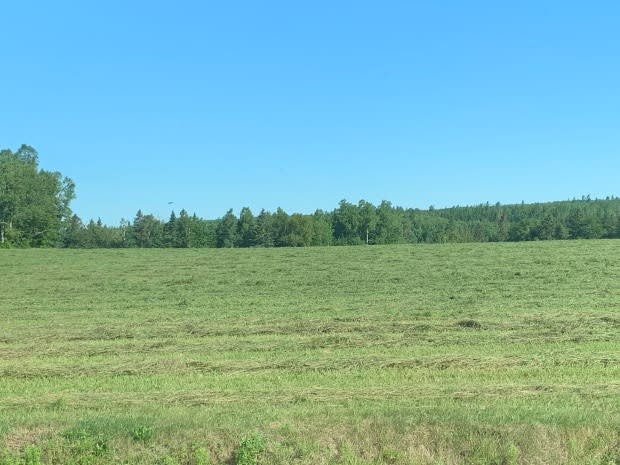Hay shortage means herd downsizing for some N.B. farmers
A lack of rain during a crucial growing period may leave many farmers across New Brunswick without the amount of hay they need to keep their herds fed this winter.
Cederic MacLeod said in the 17 years he has owned and operated Local Valley Beef, a 350-acre farm in Centreville, N.B., he has never seen the hay crop this bad.
"Guys and gals are pulling off between 50 to 70 per cent of their normal average," he said.
MacLeod said with June being the biggest growing month for hay, getting no rain really impacted its growth.
"Fredericton usually gets 80 mills but we had 15. You can't grow a crop less than that."
MaLeod said he usually gets started early in the summer to cut hay when it's at a higher quality.
"The first field we cut was about a third of what we would normally expect and so we made the decision to delay cutting for a couple of weeks and let stuff bulk up if it will."
But MacLeod said it's a sacrifice for farmers do that because as the hay matures it gets higher in yield and lower in quality.
"We pushed it to 50 per cent and then the last stuff we did was up to 70, 75, 80 per cent of what we'd expect."
As a result, MacLeod said they are downsizing their herd more than the farm normally would during the summer, not only because of the lack of hay for the winter months but also because hay in pastures is scarce as well.
"We certainly won't be expanding the herd."
Rain now, more hay later
Lisa Ashworth, president of the Agricultural Alliance of New Brunswick, said the hot and dry summer has impacted farmers across the province.
"Just recently there's been scattered showers so the first cut earlier in the summer was below average for most people," she said.
Ashworth said some producers are able to take two or even three cuts of forage off their good fields.
"If we had steady rain now and a beautiful September, we can make hay and store it later in the season as opposed to the earlier times."
But Ashworth said whether producers can make up the difference from the first cut might be difficult.

While most producers usually have extra hay stored for emergencies, Ashworth said many barns are empty.
"There is a little nervousness about how much there will be to get through the winter if we don't have a little bit of moisture and a good second and third cut."
Hay prices may go up as producers look to buy some to ensure they have enough for the winter.
MacLeod said the New Brunswick Cattle Producers can help farmers find hay if they need it from other farmers who might have some to spare.
Ashworth agreed, adding producers in the Maritime provinces have a history of sharing if they have extra hay available.
"People will make do and we hope for the best," she said.
The province said it is monitoring the situation. The Department of Agriculture, Aquaculture and Fisheries said some areas of the province have been affected to varying degrees this year, from not a little to quite severely.
"Impacts and reserves in some areas have been compounded by other previous weather patterns, including dry weather in northern areas 2018 and winter kill of forages in southern areas in the Spring of 2019," said spokesperson Nick Brown in an email.
He added the province is working to understand the full impact to make inform decisions moving forward.

